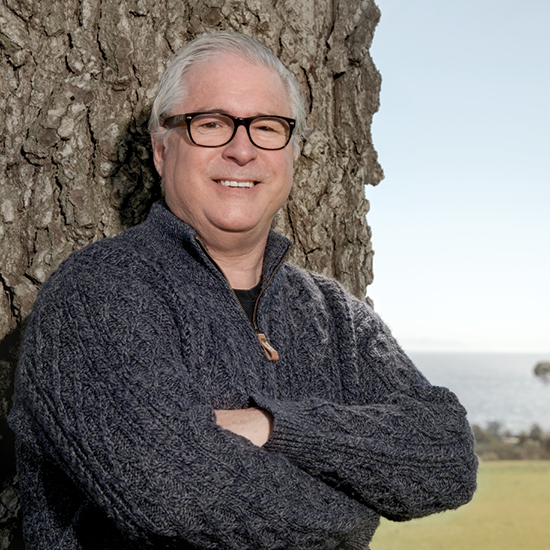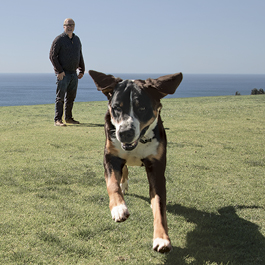Are Animals People Too?
A Caruso School of Law professor shares his views on a most controversial question
Unlike the elephant in the room, Happy, an Asian elephant residing at New York City's Bronx Zoo, is the topic of a great deal of discussion.
Happy is at the center of a legal dispute initiated by an animal rights organization
seeking her removal to an elephant sanctuary. Studies show that elephants live communally
and cooperatively and appear to grieve when a member of their herd dies. Happy lives
alone in an enclosure about an acre in size, and while she can sometimes see, smell,
and even touch with her trunk the only other elephant at the zoo, her interactions
are mostly with her human handlers rather than other elephants. The organization claiming
to act as her representative is seeking her transfer through a writ of habeas corpus,
a legal vehicle traditionally employed to request the release of an allegedly unduly
confined human. In this lawsuit, Happy is the named petitioner, the zoo is the defendant,
and the case has reached the highest court in New York State.
At issue is whether highly intelligent animals such as elephants are entitled to “personhood” under the law, entitling animals to have the power, through some form of legal guardian, to assert their interests in court. All US courts that have considered the argument have ruled in the negative, allowing animals to be the subject of protective legislation, but not to be actual litigants. The fact that the New York Court of Appeals agreed to hear the case at the request of the appellant/animal rights organization (the court was not required to do so pursuant to court rules), has only increased the speculation among animal law scholars about the outcome. In fact, Happy's case is the most significant animal rights case in our country's history, according to Richard Cupp ('83), animal welfare advocate and Caruso School of Law John W. Wade Professor of Law.

Cupp is not a newcomer to the animal personhood/protective legislation controversy. In 2014 Popular Science magazine described him as “a hugely influential force” in the animal legal personhood debate. More recently, three of the unanimous appellate courts that have rejected animal legal personhood thus far have cited Cupp's law review articles or one of his amicus briefs in support of their decisions.
His expertise in the world of animal law arose out of his love for his dog, Shasta. As a single, young torts professor in the mid-'90s, Cupp spent a lot of his spare time hiking in the hills around Pepperdine with Shasta, and their connection was very important to him. Reading about a $30,000 settlement for the emotional distress an individual suffered when his dog was negligently killed got him thinking. “It occurred to me that there is this huge disconnect between how we value our companion animals and how the law values them in the torts system. I loved Shasta with all my heart, but I knew that his market value was less than his weekly dog biscuit bill.”
Cupp decided to share his musings in a 1998 op-ed in the Los Angeles Times, posing the question of whether the law should provide compensation in the form of damages for the loss of a pet that is negligently killed. Noting that the loss of a pet's companionship is a very real, very deep loss for many individuals, he concluded that it would ultimately be best not to make such a change. Observing that the law doesn't always compensate losses and must also look at public policy and what's good for society, Cupp further reasoned that a likely result of such a policy would be an increase in the number of lawsuits brought against veterinarians. This would result in higher insurance costs for the veterinarians and higher veterinary fees, which would lead to less willingness among some pet owners to pay for treatment. In the long run, the losers in this scenario would be the animals themselves.
If we move toward treating animals like humans under the law, we then open the door to arguments that it is immoral to value an animal's life less than a human life, or even that some intelligent animals' lives are more valuable than the lives of some humans.
More broadly, Cupp wrote that he felt the law's distinction between animals and humans was proper—the relationships between humans, while undoubtedly more complicated and challenging than humans' relationships with animals, take us deeper and call us to a higher ground. “It makes sense to me,” he recalls concluding, “to draw a line between humans and animals and say that the law needs to treat humans as a higher priority.”
Animal personhood advocates disagree, arguing that animals that are considered highly intelligent should be deemed legal “persons,” entitled to serve as legal entities in court. They contend, among other things, that “personhood” is not equated with being human from a purely legal standpoint. Instead, the proper legal construction of a person is that of a being capable of rights or duties (rather than both). Because the law protects humans who have rights but who cannot bear duties, such as infants and people who are comatose, animals who cannot bear duties should not be precluded from legal personhood.
Advocates for animal legal personhood also point to many animals' intelligence and
autonomy, particularly those of chimpanzees and elephants. Proponents for legal personhood
for Happy tout her exceptional self-awareness. In a study conducted nearly two decades
ago, Happy was the first elephant to pass a “mirror test,” in which observers found
that she recognized herself as a self—an awareness seen in a very few species. Proponents
argue that such self-recognition is linked in humans to personal memory and is demonstrative
of an ability to direct one's behavior.
Briefs in support of the lawsuit have been filed by highly respected legal scholars from both the US and the UK and groups of philosophers, Buddhist scholars, and Catholic theologians, among others. Many people believe that Happy's present existence is a sad one and that she is lonely and suffering. The Bronx Zoo rejects arguments that the 51-year-old elephant is languishing. In 2020 it issued a statement reading, “At this time, the veterinarians, keepers, and curators at the Bronx Zoo believe it is best for Happy to remain in familiar surroundings with the people she knows, relies on, and trusts.” Further, organizations such as the American Veterinary Medical Association, the National Association for Biomedical Research, and the Association of Zoos and Aquariums have filed briefs opposing the lawsuit.
While not an expert on elephants, Cupp considers the question of what is the best home for Happy to be a legitimate debate. Granting Happy legal personhood is not the prudent path toward greater protection of animals under the law, according to Cupp and other proponents advocating for legal protections for animals rather than legal personhood.
“My primary argument is that our society appropriately connects personhood rights with a norm of societal accountability,” he says. “And divorcing personhood rights from the human community's norm of accountability is particularly dangerous for vulnerable human beings, such as children or people with intellectual disabilities. If an elephant or a chimpanzee is found to have higher cognitive capacities than an individual human, and a basis for legal personhood is the intellectual capability of some individual being, over time it could result in our society and courts deeming some humans to be inferior.”
Cupp elaborates that we would soon see a flood of lawsuits seeking to end, as examples, much biomedical research and the consumption of meat. “If we move toward treating animals like humans under the law,” he says, “we then open the door to arguments that it is immoral to value an animal's life less than a human life, or even that some intelligent animals' lives are more valuable than the lives of some humans.”
A better way to move forward in safeguarding animals' welfare, argues Cupp, is through thoughtful legislation. He notes that as a society, our laws are continually developing in recognition of animals' intellectual capacities and in furtherance of their well-being. “The best illustration is, if you went back 30 years ago, almost no states made animal cruelty eligible for felony status,” he says. “But because society has been shifting, there's been a huge evolution such that in 2014, South Dakota became the final state to make animal cruelty felony eligible.”

While firm in his stance against animal personhood, Cupp is not an ideologue. “I'm an animal welfare advocate,” he says. “And if you're an animal welfare advocate, you can't just say no to everything that might have implications in support of an animal personhood argument.” The right approach, in Cupp's mind, is to weigh the benefits to animals against the risks of creating an animal personhood paradigm. When he understands the benefits to be greater than such dangers, he supports the related evolution of law or policy. In keeping with this belief, Cupp published a law review article favoring a 2016 Connecticut statute that, although it could be argued as a stepping stone toward animal legal personhood, allowed judges to appoint advocates for justice (who are likely to promote the interests of the animal) in animal cruelty prosecutions.
The New York Court of Appeals has accepted the responsibility of making a decision of major consequence. Beyond Happy's future, the management of our many and varied relationships with animals, and even one another, could hang in the balance. Happy's case has called us as a society to engage deeply in the moral struggle of how the law should treat animals. She may, in fact, be one elephant in the room we will be talking about for years to come.
